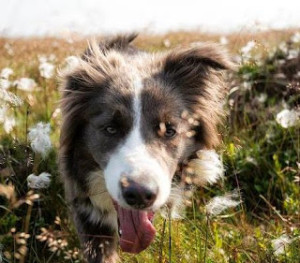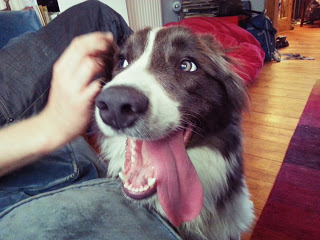How my dog helps me remember to be mindful through acceptance, curiosity, living in the moment and pure joy.
Be more dog?
O2’s recently launched ‘Be more dog‘ campaign got me thinking. Their emphasis is on finding excitement and joie de vivre in a world too bored and their aim is to sell their services. But since getting our collie Dr Watson seven months ago, I’ve realised that there is a lot that dogs can teach us.
excitement and joie de vivre in a world too bored and their aim is to sell their services. But since getting our collie Dr Watson seven months ago, I’ve realised that there is a lot that dogs can teach us.
Spending time with Watson reminds me of some of the core teachings of the Mindfulness Based Therapy for Depression course I completed last year.
Acceptance
Dogs are incredibly accepting. Watson takes his experiences as they come. He doesn’t make judgements about what is going on in his head or feel that he ‘should’ be feeling differently. He just feels.
Sometimes he feels rubbish for a bit – like when he naughtily eats old food he finds in the park and then throws up. Or when he gets told off for eating fluff out of his bed. But as soon as he feels better, he embraces it. He doesn’t dwell on the time he felt bad and let it seep into his better mood.
We can learn something from this. Humans have a tendency to judge our experiences all the time – often on auto pilot. We usually judge them as not being quite right in some way – thinking that this is not quite what should be happening, or not what we should be feeling. These can then lead into thoughts about blame and what could or should be different – “I shouldn’t be feeling like this, I’m always getting things wrong, things are always going to be like this”. We get sucked into ruminating and end up in those well worn grooves of negative thoughts.
Unlike dogs, humans are used to ‘intellectual’ problem solving – using thoughts to move from a problem to a solution. However, the trouble comes when we try to use intellectual problem solving to approach an emotional problem. To put it another way, we try to use thoughts to solve a feeling.
Trying to solve our moods through thinking leads to the rumination a lot of us are familiar with. Thoughts circle round in our heads without our really even being aware of it. These thoughts often pretend to be questions it is possible to answer. To add to this, we are often monitoring ourselves against unhelpful ‘standards’ of happiness that we set ourselves. We wake up feeling bad – and make it worse by comparing it in our thoughts to how we feel we should be. This leads to the vicious spiral of rumination – ‘Why am I feeling like this…I shouldn’t be…no one else struggles this much….maybe it’s because of this…I’m letting everyone down’ – as if, somehow, if we found the elusive ‘answer’, all would be fine.
What if instead we accepted how we felt in the moment, took actions to try and do things to distract us and waited until our experience or feelings changed. With this approach our negative feelings are just something to be dealt with in the moment and are much less likely to worsen and spiral down.
Of course, Watson’s acceptance comes from his inability to think in any other way – we have to more consciously use mindfulness or something similar to practice this kind of approach.
Curiosity
 Whatever we’re up to Watson is there sticking his nose in, interested in this new thing. In a new place he’ll busily give it a once over with his nose, checking every corner for smells that tell stories of what has been there before. Mindfulness encourages us to approach our body and mood with a gentle curiosity. This means taking time to experience our feelings and emotions, even the more negative ones, instead of immediately trying to push them away. Doing this can help you recognise how your body and mind interact. This is something we don’t often take the time to examine.
Whatever we’re up to Watson is there sticking his nose in, interested in this new thing. In a new place he’ll busily give it a once over with his nose, checking every corner for smells that tell stories of what has been there before. Mindfulness encourages us to approach our body and mood with a gentle curiosity. This means taking time to experience our feelings and emotions, even the more negative ones, instead of immediately trying to push them away. Doing this can help you recognise how your body and mind interact. This is something we don’t often take the time to examine.
A good example of this that the recent heatwave brings to mind is that many people who suffer from anxiety actually report feeling more anxious in the heat. It seems that this is because the bodily feelings that being hot produces – uncomfortably warm, ‘pressed down on’ and short of breath are similar to those you might experience in an anxiety attack. If you usually associate these sensations with anxiety and panic then what were initially just bodily sensations can create changes in mood and emotion. Making space to explore your bodily sensations before this spiral starts can help you recognise that the bodily sensations are coming from the heat and not from your anxiety. You can take action to cool down instead.
Of course Watson isn’t curious about his mind – that’s a curiosity that only humans are capable of. But he can also remind us that the world is out there for him and us to be curious about. Learning and discovery can give us pleasure and boost our sense wellbeing and achievement. Take time for yourself to master something new. Expand your horizons beyond your usual circles and routines. Stop to take pleasure in small things – chasing a squirrel or giving a stick a good chew perhaps?
Living in the moment
Watson doesn’t worry about the future or ruminate on the past. Nor does he make comparisons with others’ experiences. We explored this a bit earlier when thinking about how mindfulness encourages us to explore and accept how we feel right now without trying to think our way out of it. But we can also try to be in the moment in other ways. How often do we worry unnecessarily about what is to come or go over and over something that happened earlier in the day or week?
Next time you catch yourself doing that, bring yourself back to the present moment and try to focus on what you’re doing right now. Remember that when you’re feeling depressed you can only remember the negative times and you project those bad times into the future too. You’re not thinking with a clear perspective. Let the past go and the future unfold as it happens.
For the pure joy of it…
Things don’t have to have a point in Watson’s world. Sometimes he just runs and runs for the  pure joy of running. He’ll fetch a ball for hours and hours because each time it’s thrown he’s newly excited. He’ll leap in the water and leap out again and jump over fences and back again because it’s fun to swim and jump.
pure joy of running. He’ll fetch a ball for hours and hours because each time it’s thrown he’s newly excited. He’ll leap in the water and leap out again and jump over fences and back again because it’s fun to swim and jump.
When we’re depressed, we can’t always see the point in something that could actually help us. We experience the reverse motivation of depression. Usually we want to do something and so we do it, but in a depressed mode you sometimes have to start doing something to start wanting to do it. It’s also really hard to make decisions when you’re feeling depressed. We spend too much time worrying about the pros and cons of each course of action and how that might make us feel. What if sometimes we just went for it without thinking too much?
Even if you don’t suffer from depression Watson is a good reminder to let go a bit, to express yourself and to try and to make sure you do things that give you pleasure – whether they have a ‘point’ or not. As Watson did earlier today; try carry that enormous stick for miles because it’s fun to do – even if everyone else in the park thinks you’re silly.
This post is now also published on Everyday Mindfulness.

hi Clare,
i loved reading this. my pooch niwa has taught me so much about mindfulness- been my best teacher in fact. i look forward to exploring more of your blog- looks great.
esse
Thanks Esse 🙂 So glad you liked it, hope you find the rest of it interesting too!